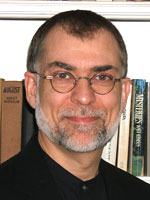 Cornell education professor Scott Peters has dedicated his career to the intersection between academia and community life. His new book, Democracy and Higher Education: Traditions and Stories of Civic Engagement, examines how higher education contributes to a democratic society. Evidence-based Living sat down with Scott to learn about his vision of Cooperative Extension.
Cornell education professor Scott Peters has dedicated his career to the intersection between academia and community life. His new book, Democracy and Higher Education: Traditions and Stories of Civic Engagement, examines how higher education contributes to a democratic society. Evidence-based Living sat down with Scott to learn about his vision of Cooperative Extension.
What first inspired you to research the topic of the public role for higher education?
“I spent 10 years working for a community-university non-profit that was located on the campus of the University of Illinois. The experiences I had and people I worked with awakened an interest in exploring the history of American higher education’s public mission and purposes. I was especially interested in understanding the origins and meaning of the “land-grant mission.” I often heard people use this phrase like it had some deep profound meaning. But I couldn’t find anyone who could explain exactly what it meant. So I would trace the origins of my interest to those experiences.”
Do you feel that academics have a duty to contribute to democracy and civic life more-so than other professionals?
“I don’t think academics have a duty that is greater than other professions. Professionals in every field and sector of society who want to be what William Sullivan calls “civic professionals” face the same challenge. They have to learn how, as Sullivan puts it, to deploy their technical expertise and judgment “not only skillfully but also for public-regarding ends and in a public-regarding way.” There’s no one “correct” way to do this. But there is a debate about what it can and should look like. I take that debate up in my new book.”
Do you think there are shortfalls in the current higher education system as a whole – that universities, in general, could do a better job of engaging in public life?
“We can and should do much better, yes. But my work has been more focused on illuminating, interpreting, and analyzing the many positive roles and contributions academic professionals and institutions are taking up and making despite the challenges and shortfalls. We give very little attention to faculty members’ civic engagement work. And we devote very little time and space for serious conversation about it. By ‘serious,’ I mean research-based, with robust theoretical and historical groundings.”
Do you have a vision of what the world would look like if engaged professors did a better job of reaching out to help communities?
“I have a vision of what it would look like if we invested more time and attention to understanding and learning from stories of the civic work that professors (and students and staff) are already doing. If we did, there would be a much richer understanding of the public and academic significance of this type of work. We’d see it as a multidimensional activity that has both academic and civic value. But we’d also see it as something that can and needs to be improved. “
Is there anything else people should know about your work?
“I’ve been spending a lot of time investigating the ways the public work of the academy helps to strengthen democracy. That’s helped me to see that things like extension, outreach, and engagement aren’t just “service” activities. They aren’t just about helping communities and solving problems. And they’re certainly not just about transferring information and technologies. At their best they are also avenues for pursuing and improving our teaching and our research. They’re avenues for making better colleges and universities. This isn’t a theoretical hope. It’s being demonstrated every day by civically-engaged faculty, staff, and students at Cornell and elsewhere, and has been for well over a hundred years. One of the most important things I’ve been learning in my research is that engagement work absolutely depends on the development of strong public relationships between the academy and its various external publics. My work is all about helping people to think deeper and better about what it takes to build and sustain these relationships in ways that strengthen democratic processes, principles, and ideals.”



Speak Your Mind